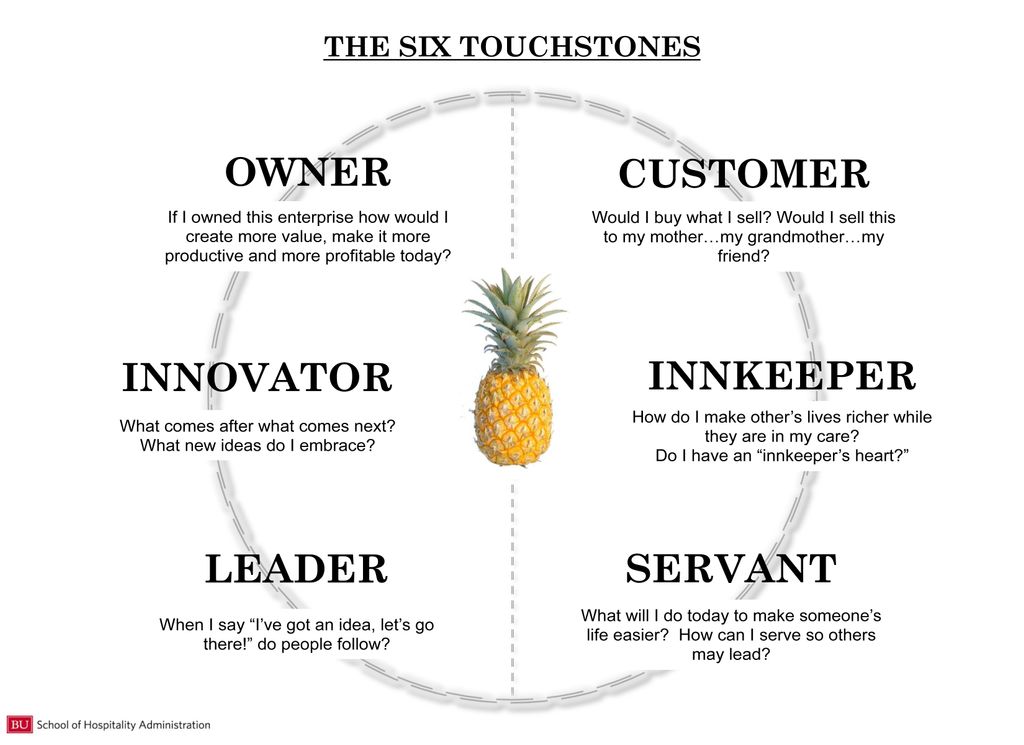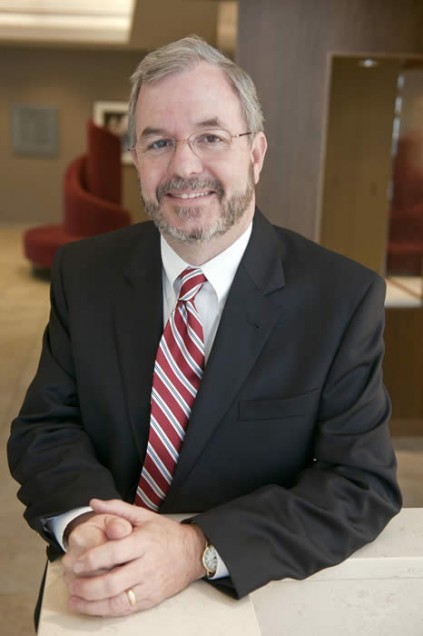“The Six Touchstones” A Model for Hospitality Students

By Christopher Muller and Michael Oshins
Hospitality management education requires many different perspectives to be considered, given the broad array of pedagogies used throughout a four-year curriculum. With some planning—and, sometimes, with a bit of serendipity—simple ideas may resonate with students well beyond the time they spend in a classroom.
In previous Boston Hospitality Review issues, we have identified several methods that may be applied so students are able to cope with, embrace, and even leverage change in the hospitality industry. Included in this has been a number of strategies and tactics, which may include such tested practices as engaging creativity, adopting new habits, reframing theories, and challenging accepted paradigms. Along with these, the practice of self-reflection becomes a powerful tool for adapting to the realities of our constantly changing industry.
As part of our continuing faculty discussions on an ever-changing curriculum, a few years ago we adopted a model for our students to consider in their transformational journey. We call it simply “The Six Touchstones.” An application of this model is one way for a student to relate to the hospitality industry on a personal level, accepting that they may hold multiple complex perspectives concurrently yet still be focused and effective.
Early in their first semester, we present “The Six Touchstones” to all incoming freshmen at the Boston University School of Hospitality. Other faculty reinforce it in their courses throughout the four-year curriculum. It appears again as a part of the capstone leadership course in their senior year. We believe that when our students graduate, understanding, applying, and ultimately internalizing “The Six Touchstones” will provide them with the balance required to enter the industry as a well-prepared hospitality manager.
Just as many hospitality organizations have guiding principles that become important enough to write down in the form of a mission statement or a credo, we hope that, over time, “The Six Touchstones” will take a foundational place in our shared conversation.
To introduce the discussion, we ask that each student to consider the six individuals named on the model and then to “think like…”
An Owner
Hospitality is, at its core, an entrepreneurial business, one with a strong center built upon operational success and the hard work it entails. Universally, we hold in high esteem the people who have put “their names and reputations in their businesses.” Students are reminded that there was a person, a founder, an owner, named Marriott, Hilton, Kimpton, Brinker, Puck, or Meyer. So first, we ask the students to “think like an owner.” This, we suggest, means that every day when they go to work they need to consider the questions, “If I owned this business, how would I add more value to the enterprise? If it were my place, what would I do differently?” The goal is to first instill a sense of ownership at work and the willingness to act on that sense, and secondly, to implant a future desire to be entrepreneurial.
A Customer
In balance to this, we then ask students to “think like a customer.” There are no hospitality enterprises without paying guests. Thinking like a customer presents the student with the mindset to ask themselves, “Would I buy what I sell?” Walking through the metaphorical front door of any business with the eyes of a first-time patron requires them to consider, “Would I sell this product, this service, this room, or this meal to my friends…my mother…my grandmother?” It also requires them to consider who in fact their customer is: is it the paying guest or the service employee who interacts with that guest on the front line? In the simplest of ways, students are given the opportunity to consider whether they are proud of what they do, not only in business but also in their personal lives.
An Innovator
Hospitality is a business built on the challenges of the now while constantly offering a renewed version of the “new and improved.” Asking students to “think like an innovator” is easy. Life is unfolding in front of them, but the innovator looks at the environment and sees opportunities in the future. Watts Wacker, the futurist business strategist, said it is not about what comes next – but “what comes after what comes next.” Hospitality, in a sense, is in the fashion business. Trying to stay ahead of our customers, we are in the relentless search for the next new dining trend from the next new chef, the next new lifestyle hotel, the hottest new destination resort, and the latest technological advances.
An Innkeeper
Concurrently, it is important for students to know that hospitality is one of the oldest of human activities. The tradition of welcoming travelers into the safety and protection of our care is ingrained in every culture. To “think like an innkeeper” is to stand on the foundation of thousands of years of universal practice. The innkeeper is someone with an historical perspective—someone with an innkeeper’s heart—someone who stands at the door and welcomes strangers with open arms. This touchstone asks a student to do what they have already discovered about themselves: that they seek to practice hospitality as a way of life.
A Leader
We also ask them “think like a leader.” The leader, in school or in business, says, “I’ve got an idea—let’s go there!” and people follow. The leader sets a vision, a clear path toward a different future, and people join them to move towards it. Students should know that leadership is exhibited by the entrepreneur who envisions a new restaurant concept or a new hotel format and assembles a team to bring it to market. But leadership is also shown by the person who comes up with a new room design and says “let’s do this!” or by someone who writes the agenda for a team meeting to define a future project. Thinking like a leader simply means having the courage to step up when others might not.
A Servant
Hospitality is service. The management theorist Robert Greenleaf wrote about the person who is a servant-leader, offering the business community a different kind of role model, one that is especially relevant to this industry. So, in the last of “The Six Touchstones,” we ask students to apply this model and to “think like a servant.” The servant-leader is one who serves those in their care so that they may then lead and serve others. This is a natural cycle for our hospitality work: serve, lead, serve, lead, and serve again. Leaders, by definition, have followers. Servant-leaders, by definition, serve those followers by asking themselves, “What can I do to make their jobs, their work, easier and more meaningful today?”
Balance
These, then, are the dimensions of “The Six Touchstones:” Owner/Customer; Innovator/Innkeeper; and Leader/ Servant. In the graphic of the model, there is a line dividing the two sides into groups of three. One side, the Owner/Innovator/Leader perspectives ask the students to look outwards, away from themselves and towards the environment. The other side, Customer/Innkeeper/Servant, suggests that they look inwards, towards self-reflection. Combined and balanced, we feel these “Six Touchstones” provide students with a sound set of complementary perspectives to use as they become future hospitality managers.
Christopher C. Muller is Professor of the Practice of Hospitality Administration and former Dean of the School of Hospitality Administration at Boston University. Each year, he moderates the European Food Service Summit, a major conference for restaurant and supply executives. He holds a bachelor’s degree in political science from Hobart College and two graduate degrees from Cornell University, including a Ph.D. in hospitality administration. Email cmuller@bu.edu
Michael Oshins is Associate Professor of the Practice of Leadership in the School of Hospitality Administration at Boston University. He is former Vice President of Integer Dynamics, a hospitality consulting firm focused on operational productivity and technology. He holds a doctorate in human resource education from Boston University and a master’s degree in hotel administration from Cornell University. Email: moshins@bu.edu



19 comments
In the simplest of ways, students are given the opportunity to consider whether they are proud of what they do, not only in business but also in their personal lives. https://www.guide4sure.com/HashiCorp-guide.html
Get cheap d4 items at https://www.diablo4items.com
articles that are nice and very interesting I like to read the articles you make
PUF Panel Manufacturer
When i read this blog i think this is the best info for me.
Best Travel Agency in Jaipur
Your article contains a lot of useful information, which I appreciate you taking the time to provide.
astrology consultancy
This is the one of the most important information for me. And I am feeling glad reading your article.
Free Astrology Consultancy Advice Online
Nice I really like your essay, and I’m expecting that using it would be beneficial.
Bus Rental in Jaipur
It serves as an excellent tool to help them understand the industry’s nuances and prepare themselves for delivering exceptional service and creating memorable guest experiences. If you’re interested in exploring this further, you can find additional information at https://www.helpwithdissertation.co.uk/buy-dissertation-services/.” #HospitalityEducation #CareerPreparation #HospitalityIndustry
In the ever-evolving world of information technology, staying relevant and competitive is crucial. One way to showcase your expertise and skills is by earning certifications. Among these certifications, the HP HPE0-V25 real exam stands out as a testament to your proficiency in Hewlett Packard Enterprise (HPE) products and solutions.
Totally! Your questions are great and show a real desire to learn. It is inspiring to see someone actively searching for information and participating in lively discussions. This is an excellent opportunity to show off your knowledge and passion.
SAP Course in Pune
Drift Hunters is a great game in the drift racing genre and offers players many hours of entertainment and excitement.
For every academic problem, we have specialists that offer the best fix. We provide Dissertation Writers In UK, assignments, online tests, and more. Additionally, for students who are attempting to prioritise their studies and responsibilities, we also provide dissertation assistance services. We serve as saviors to keep your academic life from drowning. Give us a call right now to seize the chance.
Are you feeling overwhelmed with your academic paper and struggling to find time to give it the creative attention it deserves? If so, consider taking advantage of our Pro Academic Help. Our team of experts can help you with everything from thesis writing to editing and proofreading, ensuring your document is top-notch and ready to impress.
The "The Six Touchstones" model, a long-standing and effective framework, has been notably implemented in Spanish holiday resorts. This model offers a unique approach that interweaves academic learning with personal development, empowering individuals to maintain diverse viewpoints while remaining both efficient and focused.
Comprehensive & Enterprise Project Management software to plan & manage complex & diverse project portfolios. Everything from projects to resource management, budgeting to revenue forecasting, time & expense tracking, in-depth reporting & collaboration. Choice of deployment options: both SaaS & On-Premise.
Comprehensive & Enterprise Portfolio management toolto plan & manage complex & diverse project portfolios. Everything from projects to resource management, budgeting to revenue forecasting, time & expense tracking, in-depth reporting & collaboration. Choice of deployment options: both SaaS & On-Premise. Our SaaS version of project management software guarantees 99.99% up-time for complete peace of mind while our on-premise option offers zero additional software setup cost with Linux & PostgreSQL.
Power Automate can be used to personalize guest interactions based on data insights, ensuring that automated responses and actions reflect empathy towards guest needs and preferences.
This site offers a wide selection of newspapers in Urdu, English, and other languages, along with valuable job listings and updates from various sectors. It’s an excellent resource for staying informed about the latest news and employment opportunities in Pakistan, including Daily Epaper Download options.
Assignmentmavens provide academic help for students all over the world. Connect with us if you wish to pursue a successful academic career.